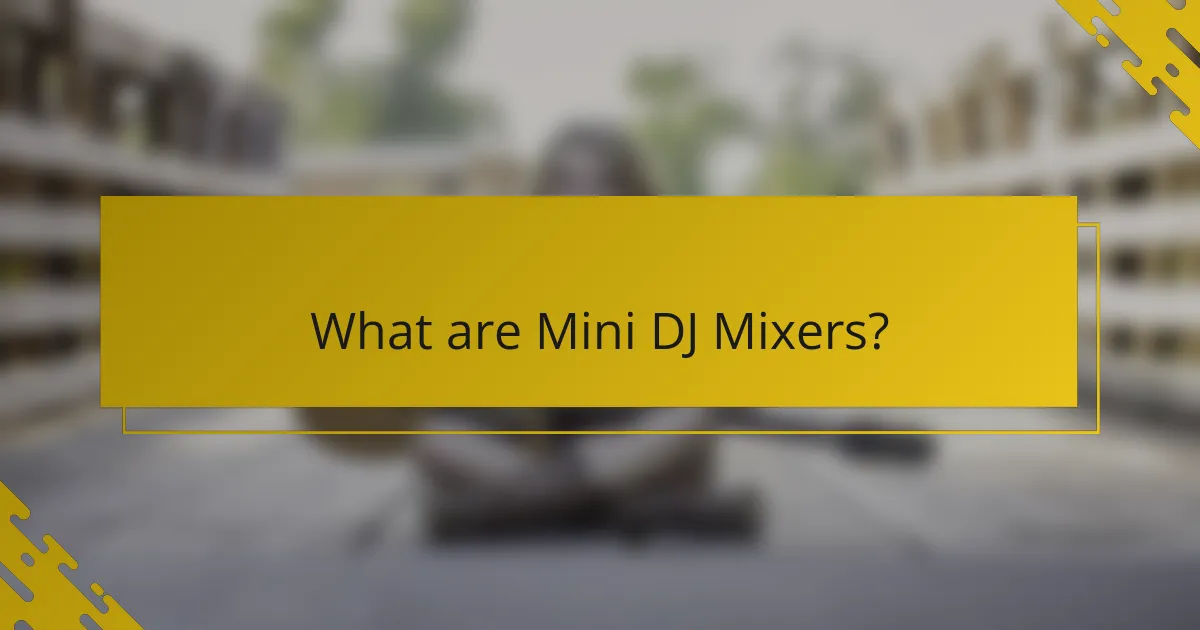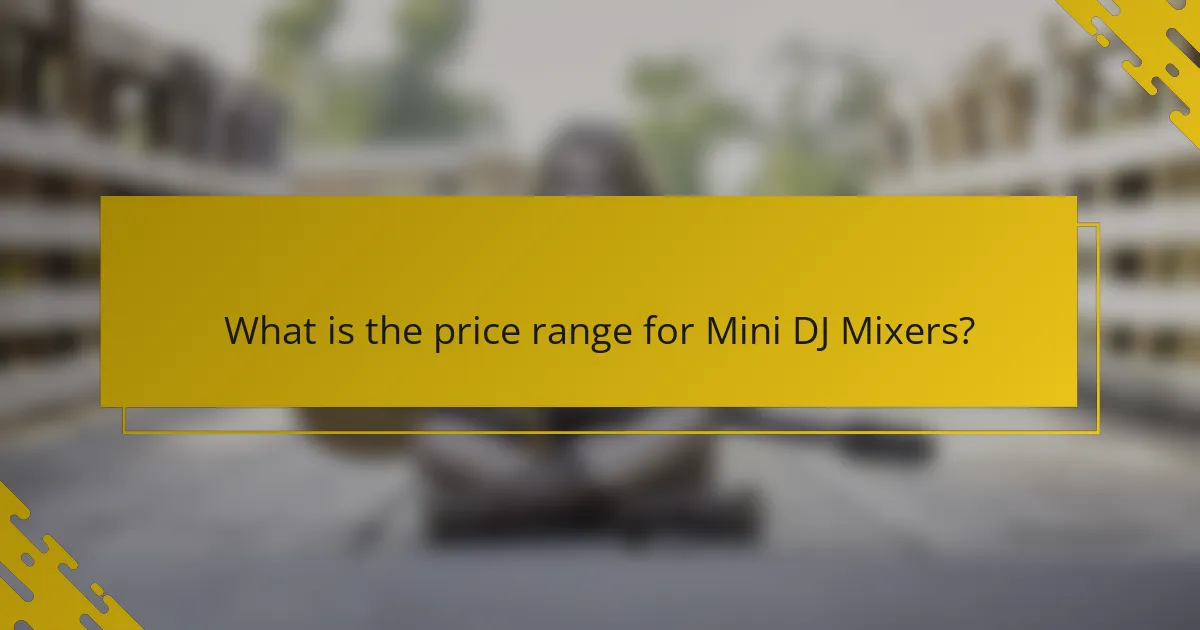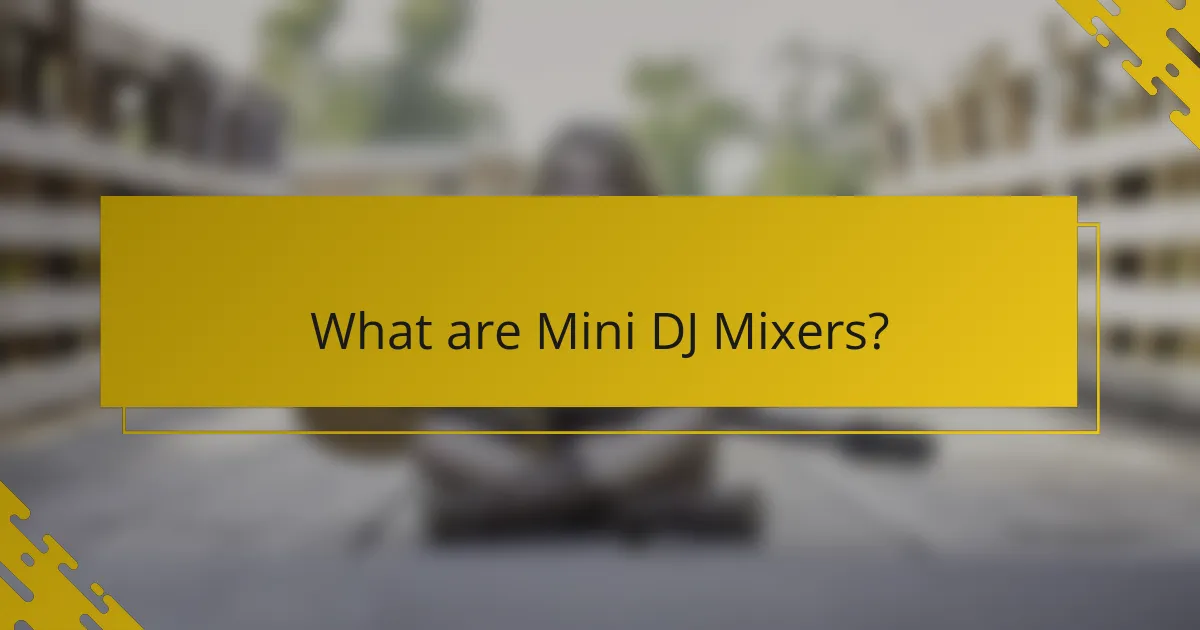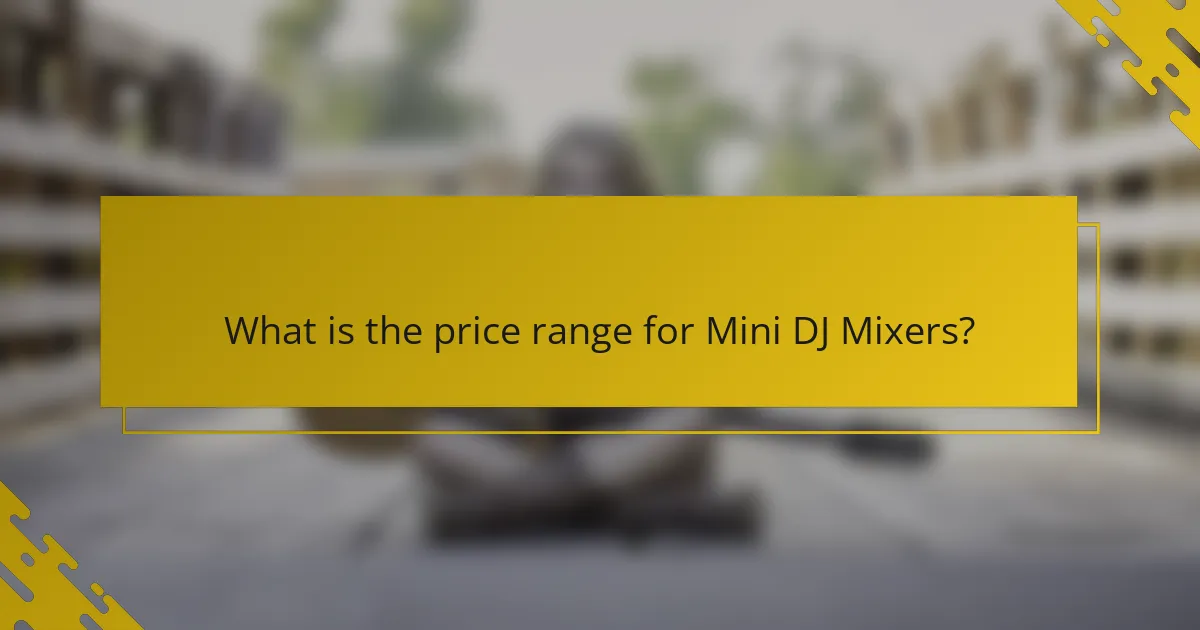Mini DJ mixers are compact audio devices designed for DJs to blend and manipulate sound from various audio sources. This article explores the essential features of mini DJ mixers, including the importance of multiple input channels, built-in effects, and USB connectivity for seamless integration with computers. It also highlights the significance of portability, with many models weighing under 3 pounds, making them ideal for mobile use. Additionally, the article discusses the price range for mini DJ mixers, which typically varies from $50 to $500, influenced by features and brand reputation, ensuring options for both beginners and professionals.

What are Mini DJ Mixers?
Mini DJ mixers are compact audio devices used by DJs to blend and manipulate sound from multiple audio sources. They typically feature a limited number of channels, allowing for basic mixing functions. These mixers are designed for portability, making them ideal for mobile DJs or small venues. Many mini DJ mixers include built-in effects and EQ controls for enhancing sound quality. They often connect to laptops, smartphones, or other sound equipment via USB or audio cables. The size and functionality make them accessible for beginners and convenient for professionals. Some popular models are lightweight, weighing under 3 pounds, and are easy to transport.
How do Mini DJ Mixers differ from traditional mixers?
Mini DJ mixers are typically more compact and portable than traditional mixers. They are designed for ease of transport and use in smaller spaces. Traditional mixers often have more channels and features, catering to professional setups. Mini DJ mixers generally offer fewer inputs and simpler controls. This makes them user-friendly for beginners and casual DJs. Additionally, mini mixers may lack advanced effects and routing options found in traditional models. Their size often limits the number of physical controls and outputs. However, mini mixers are often more affordable, appealing to budget-conscious users.
What are the key features of Mini DJ Mixers?
Mini DJ mixers typically feature compact designs, allowing for easy portability. They often include multiple channels for mixing different audio sources. Many models come with built-in effects to enhance sound quality. A USB connection is common for easy integration with computers. Some mixers have headphone outputs for monitoring audio. They may also feature EQ controls for adjusting sound frequencies. Additionally, many mini DJ mixers offer crossfade functionality for seamless transitions. These features make mini DJ mixers versatile tools for both beginners and experienced DJs.
What types of Mini DJ Mixers are available?
There are several types of Mini DJ Mixers available. These include analog mixers, which use physical controls for sound manipulation. Digital mixers are also common, offering software integration for enhanced functionality. USB mixers provide direct connectivity to computers for easy recording and playback. Some mixers feature built-in effects for live sound enhancement. Others are portable models designed for easy transport. Battery-operated mixers are available for outdoor use without power sources. Each type caters to different user needs and preferences.
Why are Mini DJ Mixers popular among DJs?
Mini DJ mixers are popular among DJs due to their compact size and versatility. Their portability allows DJs to easily transport them for gigs and events. Many mini mixers include essential features like EQ controls and multiple input channels. This functionality enables seamless mixing of different audio sources. Additionally, mini DJ mixers are often more affordable than larger models. This cost-effectiveness makes them accessible to beginner DJs. Their user-friendly design simplifies the learning curve for new users. Overall, the combination of portability, functionality, and affordability contributes to their popularity.
What advantages do Mini DJ Mixers offer for live performances?
Mini DJ mixers offer several advantages for live performances. They are compact and lightweight, making them easy to transport. Their small size allows for quick setup and teardown during events. Mini DJ mixers often have essential features like EQ controls and effects, which enhance sound quality. They typically include multiple input channels, enabling seamless transitions between tracks. Many models also support USB connectivity, facilitating easy integration with digital devices. Their affordability makes them accessible for beginners and mobile DJs. Overall, mini DJ mixers provide versatility and convenience, essential for dynamic live performances.
How do Mini DJ Mixers enhance portability for DJs?
Mini DJ mixers enhance portability for DJs by being compact and lightweight. Their small size allows for easy transport in bags or backpacks. Many models are designed for quick setup and breakdown. This convenience is crucial for mobile DJs who perform at various venues. Additionally, battery-powered options increase flexibility in locations without power outlets. Some mini mixers also feature USB connectivity for easy integration with laptops and digital devices. These design elements make mini DJ mixers ideal for on-the-go performances.

What features should you look for in the best Mini DJ Mixers?
Look for multiple input channels in the best Mini DJ Mixers. This allows for connecting various audio sources simultaneously. Additionally, check for built-in effects. These enhance sound quality and provide creative options. A compact design is crucial for portability. Mini DJ Mixers should also have USB connectivity for easy integration with computers. A headphone output is essential for monitoring audio without disturbing others. Finally, consider the quality of the faders and knobs. High-quality controls ensure durability and precision during performances.
How do input and output options affect Mini DJ Mixers?
Input and output options significantly influence the functionality and versatility of Mini DJ Mixers. A wider range of input options allows DJs to connect various audio sources, such as laptops, smartphones, and turntables. This flexibility enables seamless transitions between different audio formats during performances. Output options determine how sound is delivered to speakers or recording devices. Multiple output channels can facilitate complex setups, such as sending different mixes to separate speakers. Enhanced connectivity options, like USB and Bluetooth, improve integration with modern devices. Overall, diverse input and output configurations enhance a Mini DJ Mixer’s usability in various settings.
What types of connectivity options are essential?
Essential connectivity options for mini DJ mixers include USB, RCA, XLR, and TRS inputs. USB connectivity allows for direct connection to computers for audio streaming and digital recording. RCA inputs are standard for connecting to external devices like CD players and turntables. XLR inputs provide balanced audio connections, reducing noise and interference. TRS inputs are used for connecting instruments and microphones, offering versatility in sound sources. These connectivity options ensure compatibility with various audio equipment, enhancing the mixer’s functionality.
How do built-in effects and sound processing capabilities enhance performance?
Built-in effects and sound processing capabilities enhance performance by providing DJs with tools to manipulate audio in real-time. These features allow for creative mixing and sound design. Effects such as reverb, echo, and filters can transform tracks, adding depth and character. Sound processing capabilities ensure high-quality audio output with minimal distortion. They also enable seamless transitions between songs, maintaining energy on the dance floor. Many mini DJ mixers come equipped with these features, making them suitable for both beginners and professionals. This versatility contributes to an engaging live performance experience.
Why is portability important for Mini DJ Mixers?
Portability is crucial for mini DJ mixers because it allows DJs to perform in various locations easily. Mini DJ mixers are often used for mobile gigs, parties, and events. Their lightweight design facilitates transportation without compromising functionality. A portable mixer can fit into a backpack or small case, making it convenient for travel. Additionally, portability enhances the flexibility of a DJ’s setup. DJs can quickly set up and pack down, saving valuable time during events. The demand for portable equipment has increased, as many DJs prioritize mobility in their performances.
What design elements contribute to the portability of Mini DJ Mixers?
Compact size enhances the portability of Mini DJ Mixers. Smaller dimensions allow for easy transport and storage. Lightweight materials contribute to reduced weight, making them easier to carry. Integrated handles or straps facilitate convenient movement. Battery operation eliminates the need for power outlets, increasing flexibility. Foldable components, like knobs or screens, further reduce space during transport. Durable construction ensures that mixers withstand travel conditions. These design elements collectively make Mini DJ Mixers highly portable and user-friendly.
How does weight impact the usability of Mini DJ Mixers?
Weight significantly impacts the usability of Mini DJ Mixers. Heavier mixers can be more stable during use, reducing the risk of accidental movement. This stability is crucial during live performances where precision is necessary. Conversely, lighter mixers offer enhanced portability, making them easier to transport for gigs. Many DJs prioritize portability, especially those who travel frequently. A weight range of 1 to 5 pounds is common for mini mixers, balancing usability and convenience. Ultimately, the choice between weight and usability depends on the specific needs of the DJ.

What is the price range for Mini DJ Mixers?
The price range for Mini DJ Mixers typically falls between $50 and $500. Entry-level models are available around $50 to $150. Mid-range options usually cost between $150 and $300. High-end mixers can reach prices from $300 to $500. This range is influenced by features, brand reputation, and build quality. For instance, well-known brands often command higher prices due to reliability and performance.
How does the price of Mini DJ Mixers vary by brand and features?
The price of Mini DJ Mixers varies significantly based on brand and features. Entry-level models from brands like Numark and Behringer can start around $50. Mid-range options from brands like Pioneer and Roland typically range from $150 to $300. High-end models from brands like Denon DJ can exceed $500. Features such as the number of channels, built-in effects, and connectivity options influence pricing. Mixers with advanced features, such as USB audio interfaces or integrated sound cards, tend to be more expensive. Additionally, brand reputation and market positioning also play a crucial role in price variation.
What are the budget options available for Mini DJ Mixers?
Budget options for Mini DJ Mixers typically range from $50 to $300. Within this range, several reputable brands offer models catering to various needs. For example, the Numark M6 USB is priced around $200 and provides essential features for beginners. The Behringer DJX750 is another option, available for approximately $150, offering multiple channels and effects. Additionally, the Pioneer DJ DDJ-200 is priced around $150 and is designed for mobile use with a user-friendly interface. These budget-friendly mixers maintain a balance between affordability and functionality, making them suitable for entry-level DJs.
What premium features justify higher price points in Mini DJ Mixers?
Premium features that justify higher price points in Mini DJ Mixers include advanced sound processing capabilities, enhanced connectivity options, and superior build quality. Advanced sound processing allows for better audio effects and seamless transitions. Enhanced connectivity options, such as Bluetooth and USB integration, facilitate versatile use with various devices. Superior build quality often results in increased durability and reliability during performances. Additionally, features like onboard effects, customizable settings, and professional-grade audio output are commonly found in higher-end models. These features collectively contribute to an improved user experience and overall performance, justifying the increased cost.
How can you choose the right Mini DJ Mixer for your needs?
To choose the right Mini DJ Mixer for your needs, assess your specific requirements first. Determine the number of channels you need based on your setup. Consider the portability of the mixer if you plan to travel frequently. Evaluate the mixer’s connectivity options, such as USB and Bluetooth, for compatibility with your devices. Check the sound quality specifications, including signal-to-noise ratio and frequency response. Look for additional features like built-in effects or EQ controls that enhance your mixing capabilities. Finally, compare prices across various models to ensure you stay within your budget while meeting your needs.
What factors should you consider when comparing different models?
When comparing different models of mini DJ mixers, consider features, portability, and price. Features include the number of channels, effects, and connectivity options. Portability refers to size, weight, and build quality. Price varies significantly based on brand and included features. A model with more features may justify a higher price. Evaluate user reviews for performance insights. Check warranty and customer support options for reliability.
What tips can help you make an informed purchasing decision?
Research the specifications of mini DJ mixers. Look for features like channel count, effects, and connectivity options. Compare different brands and models for performance and user reviews. Check for warranty and customer service reputation. Evaluate your budget against the price range of mixers. Consider portability for your specific needs, such as size and weight. Read expert reviews and user feedback for real-world insights. Make a shortlist of mixers that meet your criteria before making a final decision.
Mini DJ mixers are compact audio devices designed for blending and manipulating sound from various audio sources, making them ideal for mobile DJs and small venues. This article covers the features, portability, and price range of mini DJ mixers, highlighting their advantages over traditional mixers, key functionalities, and types available. Additionally, it discusses essential connectivity options, built-in effects, and tips for selecting the right mixer based on individual needs and budget considerations. The price range for mini DJ mixers varies significantly, catering to both entry-level and professional users.

What are Mini DJ Mixers?
Mini DJ mixers are compact audio devices used by DJs to blend and manipulate sound from multiple audio sources. They typically feature a limited number of channels, allowing for basic mixing functions. These mixers are designed for portability, making them ideal for mobile DJs or small venues. Many mini DJ mixers include built-in effects and EQ controls for enhancing sound quality. They often connect to laptops, smartphones, or other sound equipment via USB or audio cables. The size and functionality make them accessible for beginners and convenient for professionals. Some popular models are lightweight, weighing under 3 pounds, and are easy to transport.
How do Mini DJ Mixers differ from traditional mixers?
Mini DJ mixers are typically more compact and portable than traditional mixers. They are designed for ease of transport and use in smaller spaces. Traditional mixers often have more channels and features, catering to professional setups. Mini DJ mixers generally offer fewer inputs and simpler controls. This makes them user-friendly for beginners and casual DJs. Additionally, mini mixers may lack advanced effects and routing options found in traditional models. Their size often limits the number of physical controls and outputs. However, mini mixers are often more affordable, appealing to budget-conscious users.
What are the key features of Mini DJ Mixers?
Mini DJ mixers typically feature compact designs, allowing for easy portability. They often include multiple channels for mixing different audio sources. Many models come with built-in effects to enhance sound quality. A USB connection is common for easy integration with computers. Some mixers have headphone outputs for monitoring audio. They may also feature EQ controls for adjusting sound frequencies. Additionally, many mini DJ mixers offer crossfade functionality for seamless transitions. These features make mini DJ mixers versatile tools for both beginners and experienced DJs.
What types of Mini DJ Mixers are available?
There are several types of Mini DJ Mixers available. These include analog mixers, which use physical controls for sound manipulation. Digital mixers are also common, offering software integration for enhanced functionality. USB mixers provide direct connectivity to computers for easy recording and playback. Some mixers feature built-in effects for live sound enhancement. Others are portable models designed for easy transport. Battery-operated mixers are available for outdoor use without power sources. Each type caters to different user needs and preferences.
Why are Mini DJ Mixers popular among DJs?
Mini DJ mixers are popular among DJs due to their compact size and versatility. Their portability allows DJs to easily transport them for gigs and events. Many mini mixers include essential features like EQ controls and multiple input channels. This functionality enables seamless mixing of different audio sources. Additionally, mini DJ mixers are often more affordable than larger models. This cost-effectiveness makes them accessible to beginner DJs. Their user-friendly design simplifies the learning curve for new users. Overall, the combination of portability, functionality, and affordability contributes to their popularity.
What advantages do Mini DJ Mixers offer for live performances?
Mini DJ mixers offer several advantages for live performances. They are compact and lightweight, making them easy to transport. Their small size allows for quick setup and teardown during events. Mini DJ mixers often have essential features like EQ controls and effects, which enhance sound quality. They typically include multiple input channels, enabling seamless transitions between tracks. Many models also support USB connectivity, facilitating easy integration with digital devices. Their affordability makes them accessible for beginners and mobile DJs. Overall, mini DJ mixers provide versatility and convenience, essential for dynamic live performances.
How do Mini DJ Mixers enhance portability for DJs?
Mini DJ mixers enhance portability for DJs by being compact and lightweight. Their small size allows for easy transport in bags or backpacks. Many models are designed for quick setup and breakdown. This convenience is crucial for mobile DJs who perform at various venues. Additionally, battery-powered options increase flexibility in locations without power outlets. Some mini mixers also feature USB connectivity for easy integration with laptops and digital devices. These design elements make mini DJ mixers ideal for on-the-go performances.

What features should you look for in the best Mini DJ Mixers?
Look for multiple input channels in the best Mini DJ Mixers. This allows for connecting various audio sources simultaneously. Additionally, check for built-in effects. These enhance sound quality and provide creative options. A compact design is crucial for portability. Mini DJ Mixers should also have USB connectivity for easy integration with computers. A headphone output is essential for monitoring audio without disturbing others. Finally, consider the quality of the faders and knobs. High-quality controls ensure durability and precision during performances.
How do input and output options affect Mini DJ Mixers?
Input and output options significantly influence the functionality and versatility of Mini DJ Mixers. A wider range of input options allows DJs to connect various audio sources, such as laptops, smartphones, and turntables. This flexibility enables seamless transitions between different audio formats during performances. Output options determine how sound is delivered to speakers or recording devices. Multiple output channels can facilitate complex setups, such as sending different mixes to separate speakers. Enhanced connectivity options, like USB and Bluetooth, improve integration with modern devices. Overall, diverse input and output configurations enhance a Mini DJ Mixer’s usability in various settings.
What types of connectivity options are essential?
Essential connectivity options for mini DJ mixers include USB, RCA, XLR, and TRS inputs. USB connectivity allows for direct connection to computers for audio streaming and digital recording. RCA inputs are standard for connecting to external devices like CD players and turntables. XLR inputs provide balanced audio connections, reducing noise and interference. TRS inputs are used for connecting instruments and microphones, offering versatility in sound sources. These connectivity options ensure compatibility with various audio equipment, enhancing the mixer’s functionality.
How do built-in effects and sound processing capabilities enhance performance?
Built-in effects and sound processing capabilities enhance performance by providing DJs with tools to manipulate audio in real-time. These features allow for creative mixing and sound design. Effects such as reverb, echo, and filters can transform tracks, adding depth and character. Sound processing capabilities ensure high-quality audio output with minimal distortion. They also enable seamless transitions between songs, maintaining energy on the dance floor. Many mini DJ mixers come equipped with these features, making them suitable for both beginners and professionals. This versatility contributes to an engaging live performance experience.
Why is portability important for Mini DJ Mixers?
Portability is crucial for mini DJ mixers because it allows DJs to perform in various locations easily. Mini DJ mixers are often used for mobile gigs, parties, and events. Their lightweight design facilitates transportation without compromising functionality. A portable mixer can fit into a backpack or small case, making it convenient for travel. Additionally, portability enhances the flexibility of a DJ’s setup. DJs can quickly set up and pack down, saving valuable time during events. The demand for portable equipment has increased, as many DJs prioritize mobility in their performances.
What design elements contribute to the portability of Mini DJ Mixers?
Compact size enhances the portability of Mini DJ Mixers. Smaller dimensions allow for easy transport and storage. Lightweight materials contribute to reduced weight, making them easier to carry. Integrated handles or straps facilitate convenient movement. Battery operation eliminates the need for power outlets, increasing flexibility. Foldable components, like knobs or screens, further reduce space during transport. Durable construction ensures that mixers withstand travel conditions. These design elements collectively make Mini DJ Mixers highly portable and user-friendly.
How does weight impact the usability of Mini DJ Mixers?
Weight significantly impacts the usability of Mini DJ Mixers. Heavier mixers can be more stable during use, reducing the risk of accidental movement. This stability is crucial during live performances where precision is necessary. Conversely, lighter mixers offer enhanced portability, making them easier to transport for gigs. Many DJs prioritize portability, especially those who travel frequently. A weight range of 1 to 5 pounds is common for mini mixers, balancing usability and convenience. Ultimately, the choice between weight and usability depends on the specific needs of the DJ.

What is the price range for Mini DJ Mixers?
The price range for Mini DJ Mixers typically falls between $50 and $500. Entry-level models are available around $50 to $150. Mid-range options usually cost between $150 and $300. High-end mixers can reach prices from $300 to $500. This range is influenced by features, brand reputation, and build quality. For instance, well-known brands often command higher prices due to reliability and performance.
How does the price of Mini DJ Mixers vary by brand and features?
The price of Mini DJ Mixers varies significantly based on brand and features. Entry-level models from brands like Numark and Behringer can start around $50. Mid-range options from brands like Pioneer and Roland typically range from $150 to $300. High-end models from brands like Denon DJ can exceed $500. Features such as the number of channels, built-in effects, and connectivity options influence pricing. Mixers with advanced features, such as USB audio interfaces or integrated sound cards, tend to be more expensive. Additionally, brand reputation and market positioning also play a crucial role in price variation.
What are the budget options available for Mini DJ Mixers?
Budget options for Mini DJ Mixers typically range from $50 to $300. Within this range, several reputable brands offer models catering to various needs. For example, the Numark M6 USB is priced around $200 and provides essential features for beginners. The Behringer DJX750 is another option, available for approximately $150, offering multiple channels and effects. Additionally, the Pioneer DJ DDJ-200 is priced around $150 and is designed for mobile use with a user-friendly interface. These budget-friendly mixers maintain a balance between affordability and functionality, making them suitable for entry-level DJs.
What premium features justify higher price points in Mini DJ Mixers?
Premium features that justify higher price points in Mini DJ Mixers include advanced sound processing capabilities, enhanced connectivity options, and superior build quality. Advanced sound processing allows for better audio effects and seamless transitions. Enhanced connectivity options, such as Bluetooth and USB integration, facilitate versatile use with various devices. Superior build quality often results in increased durability and reliability during performances. Additionally, features like onboard effects, customizable settings, and professional-grade audio output are commonly found in higher-end models. These features collectively contribute to an improved user experience and overall performance, justifying the increased cost.
How can you choose the right Mini DJ Mixer for your needs?
To choose the right Mini DJ Mixer for your needs, assess your specific requirements first. Determine the number of channels you need based on your setup. Consider the portability of the mixer if you plan to travel frequently. Evaluate the mixer’s connectivity options, such as USB and Bluetooth, for compatibility with your devices. Check the sound quality specifications, including signal-to-noise ratio and frequency response. Look for additional features like built-in effects or EQ controls that enhance your mixing capabilities. Finally, compare prices across various models to ensure you stay within your budget while meeting your needs.
What factors should you consider when comparing different models?
When comparing different models of mini DJ mixers, consider features, portability, and price. Features include the number of channels, effects, and connectivity options. Portability refers to size, weight, and build quality. Price varies significantly based on brand and included features. A model with more features may justify a higher price. Evaluate user reviews for performance insights. Check warranty and customer support options for reliability.
What tips can help you make an informed purchasing decision?
Research the specifications of mini DJ mixers. Look for features like channel count, effects, and connectivity options. Compare different brands and models for performance and user reviews. Check for warranty and customer service reputation. Evaluate your budget against the price range of mixers. Consider portability for your specific needs, such as size and weight. Read expert reviews and user feedback for real-world insights. Make a shortlist of mixers that meet your criteria before making a final decision.
